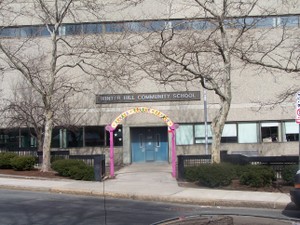
|
| If the grant is approved, up to $500,000 will go directly to the Winter Hill and Healey schools. |
|
By Martin Levenson
Teachers,
counselors and parents convened for an informal discussion on the
future of Somerville schools last Thursday. Somerville Public Schools
are in the process of submitting a proposal for new grant money from
the Massachusetts Department of Elementary and Secondary Education. The
21st Century Community Learning Center Grant will be submitted in the
next two and half weeks to the Massachusetts State House. If the grant
is approved, up to $500,000 will go directly to the Winter Hill and
Healey schools, which have consistently underperformed in state-wide
MCAS testing. The Arthur D. Healey and Winter Hill Community Schools
are below the state average for MCAS scores in all grades and subjects.
"Winter Hill is looking like it needs help," says Trish Murphy, a
teacher at Somerville High School.
Both Winter Hill and Healey
have been under this grant before, but not since June of 2008. "We are
allowed to apply for new funding for any school that's been off funding
for at least a year," says Gretchen Kinder, organizer of this meeting
and Coordinator of Research and Development in the Somerville Public
School system. This particular grant lasts five years. "Six years ago
Winter Hill and Healey were awarded this five year grant from the
Department of Education. And it ended in 08; so those two schools have
been without money the last year," Kinder tells us. So in order to help
these two Somerville schools and the hundreds of children who learn in
them, Kinder held this hour-long discussion where anyone with an
attachment to Somerville education was welcomed to join. She was quick
to say parents were most welcome in this small meeting, saying
oftentimes they know more about the children than those in the school
system.
To make the grant proposal appealing for those in the
State House there have been some changes since the last time it was
applied for. Instead of having one focus, this proposal will try to
address two types of learning in the educational system: social and
academic. On a large paper board, Kinder wrote down several possible
desired outcomes for both academic and social development within the
schools. Some of the academic ones written down were math reasoning
skills, social studies and homework ability. Some of the social ones
were public speaking, being able to work well with others, and
improvements of the after-school program. "After-school programs should
not be considered as separate from the school day; it complements the
school day," Kinder says, addressing the small assembly. In a small
interactive part of the assembly, Kinder asked all those present to put
stickers by the outcomes they see as most desirable for their students
and children. In social outcomes, most chose communication skills,
relationship with adults and peers and improvements in after-school. In
academic outcomes, most chose homework ability, science and reading
skills; no one chose social studies.
Tony Pierantozzi,
Superintendent of Somerville Public Schools had to leave this meeting
early but before doing so, he instructed those present that academic
success was his main concern. Pierantozzi sees the benefit of social
development; however he was determined to fix Somerville's academic
problems above all else, saying "We are primarily interested in direct
improvement of our academic achievement." He continued, "I'm not
talking about MCAS; I'm talking about their [a student's] ability to
express themselves through their academics.
|
Reader Comments